Chapter 2: Year in Review
2.1 Overview
20. The CMPS provided legal advice in response to 100 requests for pre-charge advice. The DMP received 46 new referrals during the reporting period and completed a total of 46 courts martial. Nine appeals were completed at the CMAC and one appeal was concluded at the SCC. One custody review hearing took place during this reporting period.
2.2 Evolution of the Military Justice System
21. The implementation of Bill C-77, brought into force on 20 June 2022, led to significant changes to the military justice system. The enactment of service infractions, dealt with through summary hearings, has had an impact on the number and types of cases referred to courts martial. There is now a much clearer divide between those matters that can be appropriately dealt with at the unit level and those that warrant a court martial. The new system also reduces the post-charge delay, as cases no longer transit through a referral authority. The charge layer now refers charges directly to the DMP.
22. Since the implementation of Bill C-77, the CMPS now provides pre-investigation advice pursuant to the new requirement contained at QR&O 102.02(2) to all members of the military police and to the CFNIS. Since July 2022, all intake for requests for any type of CMPS legal advice is performed electronically through a centralized e-mailbox. This reporting period marks the first year where all new cases received by the CMPS operated under the new regime.
23. Under the new intake process, incoming requests for advice are first reviewed by the DDMP Ops, or a delegate (hereafter DDMP Ops), who either deals with the matter directly, or assigns a prosecutor to handle the request.
24. Whenever possible and appropriate, DDMP Ops will reorient the case toward the Summary Hearing System. To do so, DDMP Ops reviews the summary of the facts provided by the investigator making the request and evaluates whether there is a possibility that the case would proceed at court martial. If it would not, then DDMP Ops clearly indicates that if the case was to be referred by a charge layer, the DMP would not prefer it for trial by court martial. This screening effort has proven to be very effective in ensuring that cases that can adequately be handled at the unit level are not unnecessarily pursued at court martial. This measure promotes the expeditious handling of alleged misconduct at the lowest possible level, while ensuring the maintenance of discipline, efficiency, and morale of the CAF.
2.3 Agreement on Principles and Presumptions for the Exercise of Concurrent Jurisdiction
25. In response to recommendations #19 and 20 of the Report of the Third Independent Review of the National Defence Act (NDA), and in collaboration with the Federal-Provincial-Territorial Heads of Prosecution, the DMP adopted the Statement of Principles and Presumptions for the Exercise of Concurrent Jurisdiction by Canadian Prosecuting Authorities.Footnote 3
26. Notwithstanding this Statement, and consistent with the DMP’s interim direction implementing Madame Arbour's interim recommendation to no longer prosecute Criminal Code sexual offences in the military justice system,Footnote 4 the DMP informed the Federal-Provincial-Territorial Heads of Prosecution Committee of his approach related to those offences.Footnote 5
27. The DMP then issued the Direction regarding the implementation of the Statement of Principles and Presumptions for the Exercise of Concurrent Jurisdiction by Canadian Prosecuting Authorities.Footnote 6 This direction, along with the Statement, will contribute to a consistent approach to military-civilian jurisdictional issues and help to inform the Canadian public on the relationship between the military and criminal justice systems.
2.4 Case Management System (CMS)
28. CMS tracks the status of files and collects data at the pre-charge, referral, post-charge, pre-trial, and trial stages. All important dates associated with these files are recorded in CMS including, but not limited to, the dates when the file was referred to the DMP, when the file was assigned to a prosecutor, the date of the decision of the prosecutor on whether or not to prefer charges, and key dates in the court martial process. CMS continues to be improved periodically.
2.5 Files in Numbers
Requests for pre-investigation legal advice and for legal advice required in the course of an ongoing investigation
29. The CMPS received 119 requests for pre-investigation legal advice. Of those, DDMP Ops reoriented 44 for handling at the unit level either through the summary hearing system or by other available means. A further 4 requests were redirected toward the civilian justice system as they involved allegations of Criminal Code sexual offences.
30. The CMPS received 56 requests for legal advice required in the course of an ongoing investigation. Of those, DDMP Ops reoriented 13 for handling at the unit level either through the summary hearing system or other available tool. A further 2 requests were redirected toward the civilian justice system as they involved allegations of Criminal Code Sexual Offences.
Pre-charge Advice
31. The CMPS received 210 requests for pre-charge advice. Of those, DDMP Ops reoriented 90 requests for handling at the unit level upon intake. A further 12 files were redirected toward the civilian justice system as they involved allegations of Criminal Code sexual offences. The remaining 98 files were assigned to a Military Prosecutor for full pre-charge review.
32. In addition to the 98 new requests for pre-charge advice assigned to Military Prosecutors, an additional 13 requests were carried over from the previous reporting period. Of the 111 total requests, 100 pre-charge advice files were completed during this reporting period, leaving 11 files still pending at the end of the current reporting period.
33. The following chart shows the number of completed pre-charge requests for the last five reporting periods:
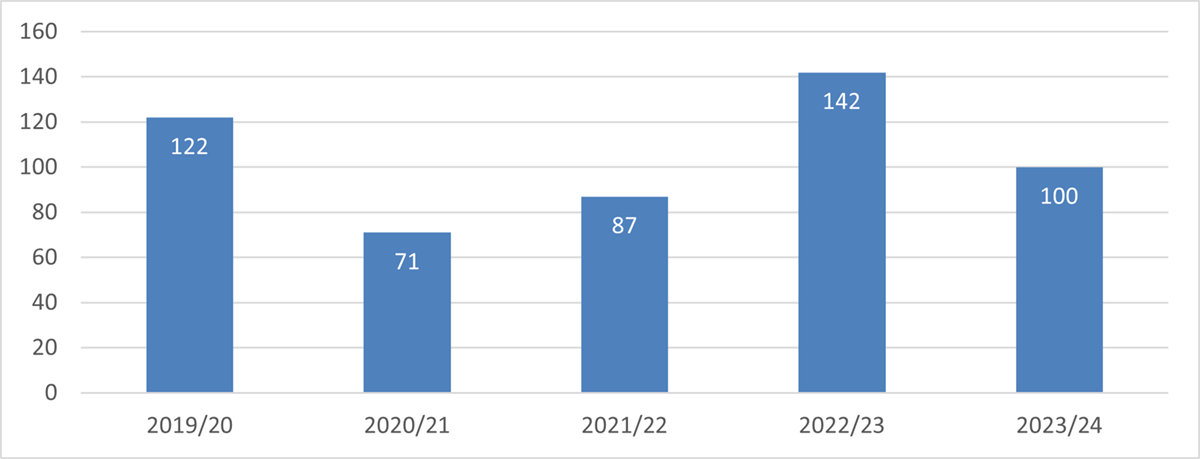
Graph breakdown: Number of completed pre-charge requests for the last five reporting periods
| 2019/20 | 2020/21 | 2021/22 | 2022/23 | 2023/24 |
|---|---|---|---|---|
| 122 | 71 | 87 | 142 | 100 |
Number of Referrals received during the reporting period
34. During this reporting period the DMP received 46 new referrals.
35. The following chart shows the number of new referrals received by CMPS for the past five reporting periods:
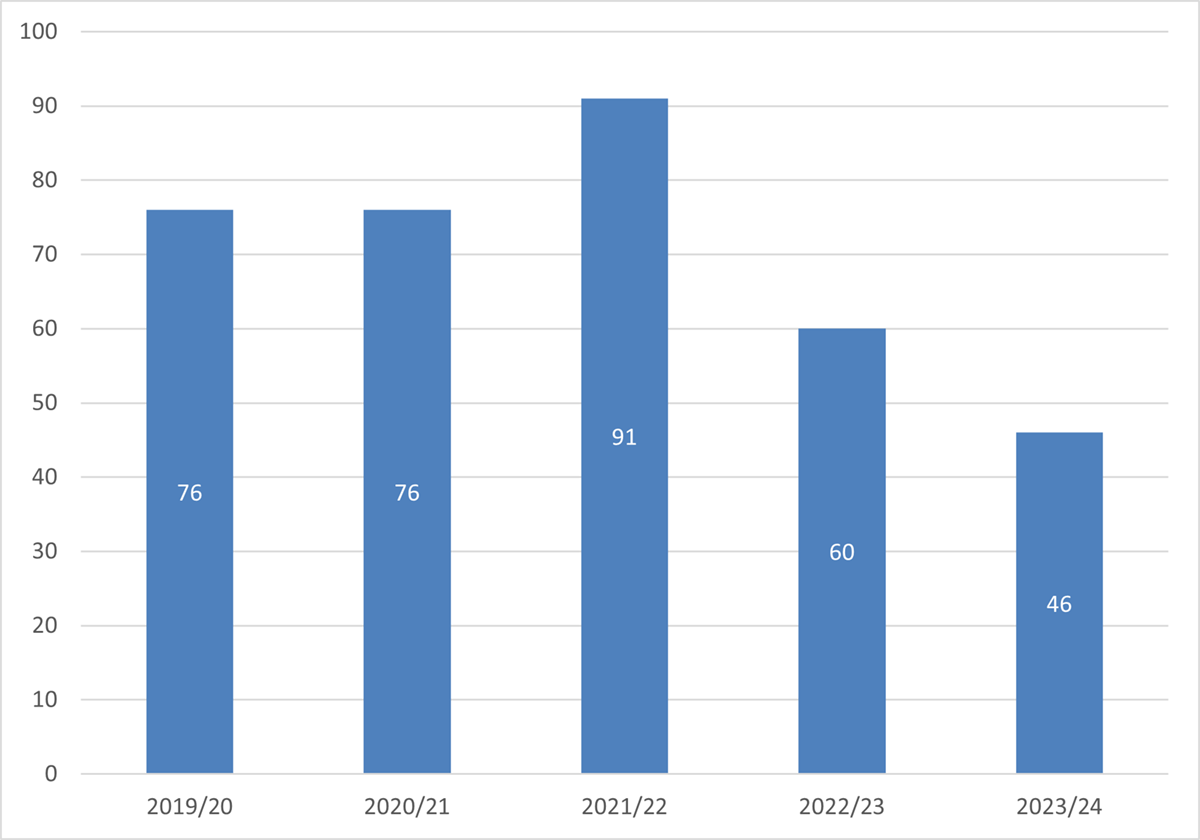
Graph breakdown: Number of new referrals received by CMPS for the past five reporting periods
| 2019/20 | 2020/21 | 2021/22 | 2022/23 | 2023/24 |
|---|---|---|---|---|
| 76 | 76 | 91 | 60 | 46 |
Preferrals and Non-Preferrals
36. During this reporting period, prosecutors made post-charge decisions in 53 files. Fifteen (15) of those decisions were made on files received before the commencement of this reporting period. As a result, from the 46 referrals received this year, 8 files were still pending a prosecutorial decision at the end of this reporting period.
37. Of the 53 post-charge reviews completed this reporting period, prosecutors preferred at least one charge in 46 files. 7 files were not preferred. The preferral rate for this reporting period is therefore 87%.
38. The next figure shows the number of preferrals and non-preferrals for the past five reporting periods. Previous years also show the number of referral of charges to the unit for summary trial, an option that no longer exists post C-77:
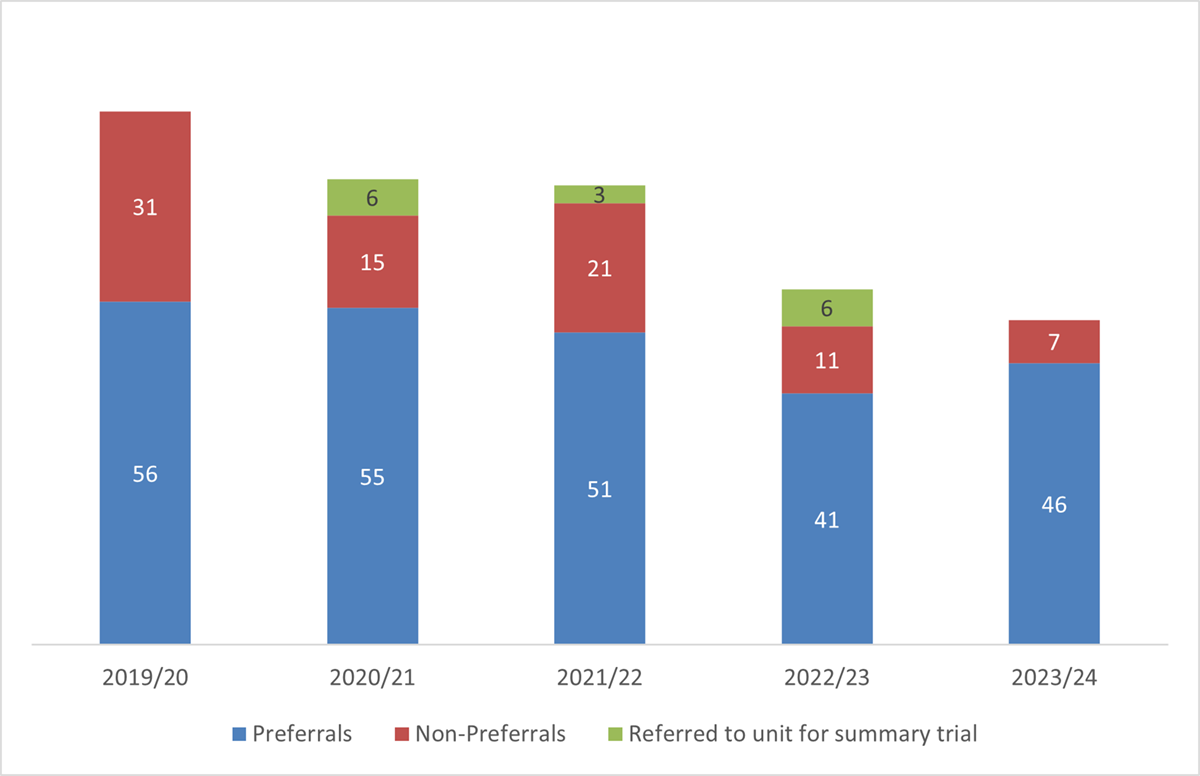
Graph breakdown: Number of preferrals, non-preferrals and referral of charges to the unit for summary trial for the past five reporting periods
| 2019/20 | 2020/21 | 2021/22 | 2022/23 | 2023/24 | |
|---|---|---|---|---|---|
| Referral to unit for summary trial | 0 | 6 | 3 | 6 | 0 |
| Non-Preferrals | 31 | 15 | 21 | 11 | 7 |
| Preferrals | 56 | 55 | 51 | 41 | 46 |
Preferral Rates by Investigative Agency
39. The incident giving rise to the charge(s) may technically be investigated by one of three military investigative agencies: the CFNIS; an investigator with the military police who is not a member of the CFNIS; or, a unit investigator. Post Bill C-77, unit investigations are rarely appropriate for incidents that warrant a court martial. While the military police may investigate service infractions in certain circumstances,Footnote 7 it should be extremely rare for a unit investigation to lead to the laying of service offence charges. If the allegation is serious enough to potentially warrant a court martial, then it should be investigated by a professionally trained police investigator.
40. The rate of preferrals varies between investigative agencies as their investigators have different levels of experience, proficiency, and training. Non-preferrals may also occur from material changes related to the case that arise between the laying of the charges and the completion of the post-charge review.
41. During this reporting period, the preferral rates by investigative agency were as follows:
- Files investigated by the CFNIS: 100% (5 of 5 files were preferred);
- Files investigated by the regular military police: 87% (41 of 47 files were preferred); and
- Files investigated by a unit investigator: 0% (0 of 1 file was preferred).
42. The next figure provides an overview of preferral rates by investigative agency over the past five reporting periods:
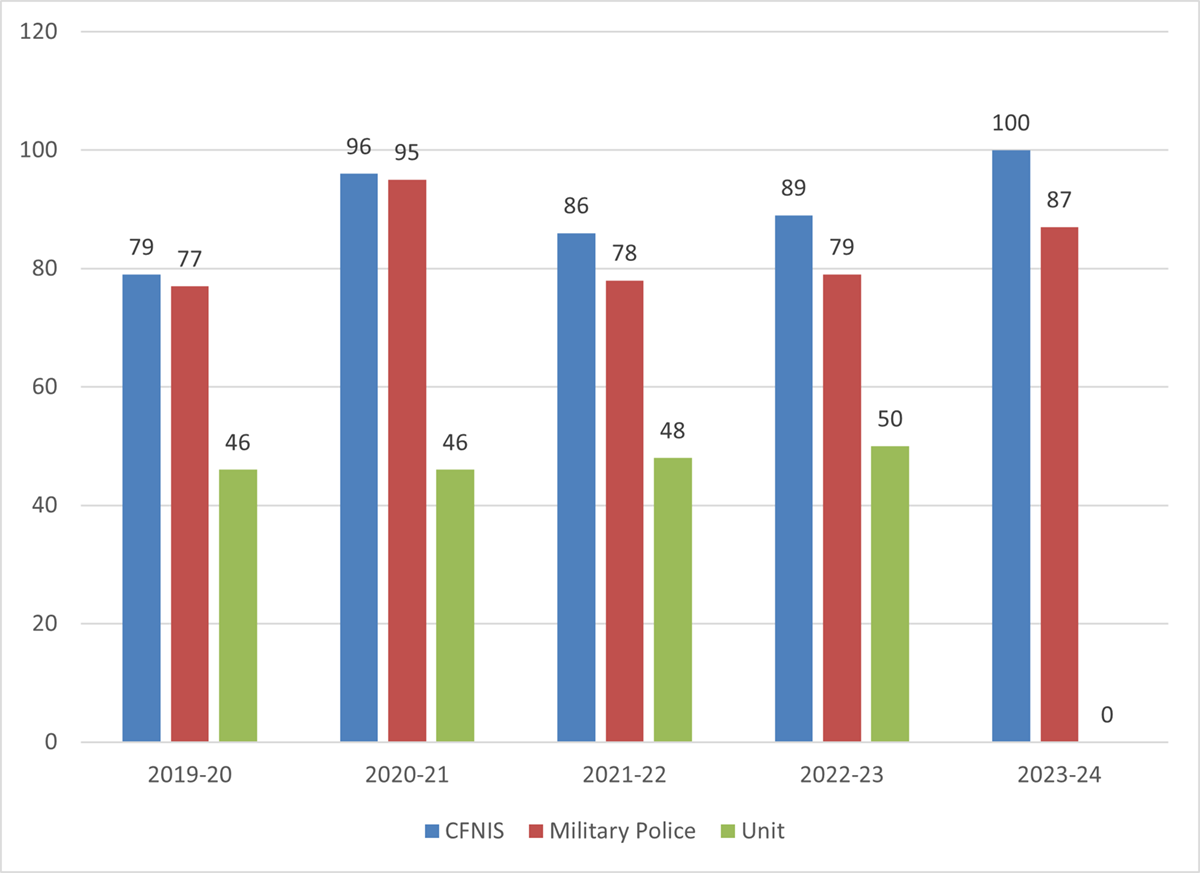
Graph breakdown: Preferral rates by investigative agency over the past five reporting periods
| 2019/20 | 2020/21 | 2021/22 | 2022/23 | 2023/24 | |
|---|---|---|---|---|---|
| CFNIS | 79 | 96 | 86 | 89 | 100 |
| Military Police | 77 | 95 | 78 | 79 | 87 |
| Unit | 46 | 46 | 48 | 50 | 0 |
Completed Courts Martial
43. This section provides an overview and analysis of cases heard at a court martial during the reporting period. For a complete list of all courts martial heard during the reporting period, please refer to Annex A.
44. A total of 46 courts martial were completed during this reporting period. Of those, 38 were Standing Courts Martial and 8 were General Courts Martial. Additionally, in 4 cases, all charges that had originally been preferred were completely withdrawn before the commencement of the trial, resulting in the conclusion of the case.
45. The next figure illustrates the number of completed courts martial by type for the last five reporting periods:
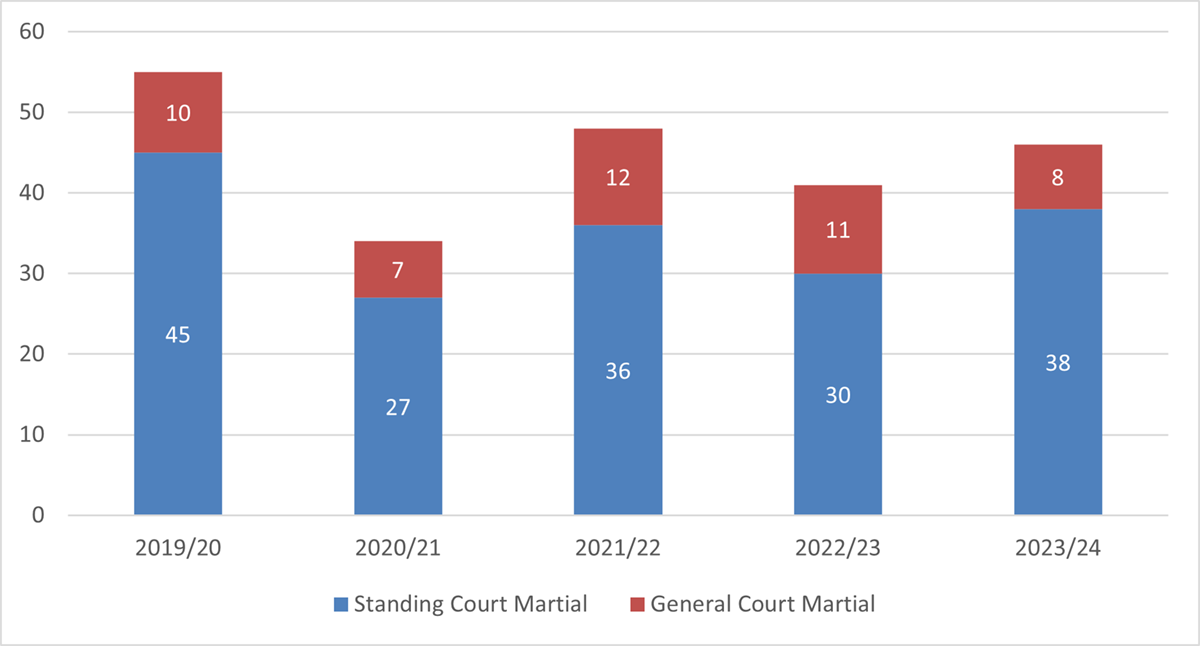
Graph breakdown: Number of completed courts martial by type for the last five reporting periods
| 2019/20 | 2020/21 | 2021/22 | 2022/23 | 2018/19 | |
|---|---|---|---|---|---|
| General Court Martial | 10 | 7 | 12 | 11 | 8 |
| Standing Court Martial | 45 | 27 | 36 | 30 | 38 |
2.6. Court Martial Cases
46. Annex A provides an overview of all the courts martial completed during this reporting period.
2.7 Notable Appeals
47. The complete list of cases completed at the CMAC is included at Annex B. The list of SCC cases is found at Annex C.
R v Crouch, 2023 CMAC 11
48. The Prosecution appealed Corporal Crouch’s acquittal by General Court Martial on two charges of indecent acts pursuant to s. 130 of the NDA and s. 173 of the Criminal Code. Corporal Crouch was alleged to have exposed himself and masturbated in front of a female friend and colleague. The only witnesses to testify were the complainant and Corporal Crouch. The latter denied the allegations.
49. The Appellant asserted the military judge erred by: (1) allowing impermissible evidence of myths and stereotypes in relation to the conduct of the complainant; (2) failing to correct a statement made by defence counsel in closing submissions; and, (3) failing to properly instruct the panel in relation to the evidence and the closing submissions.
50. The CMAC dismissed the appeal and upheld the acquittals. The Court did not find the questions posed to the complainant engaged impermissible stereotypes. The military judge correctly instructed the panel that these questions were irrelevant and that questions are not evidence.
51. The CMAC did agree with the position of the Prosecution that defence counsel invited impermissible stereotypical reasoning in their closing submissions, and that the panel instructions as to how to treat these comments could have been more complete. Yet, the Court found that, cumulatively, these errors did not have a material impact on the verdict.
R v Ellison, 2024 CMAC 3
52. Major Ellison was charged with four fraud-related offences. While acting as Wing Surgeon and Detachment Commander of a CAF Health Services Department in North Bay, ON, he was alleged to have written controlled drug prescriptions in the names of third parties for the benefit of his wife.
53. Major Ellison was acquitted of all charges (R v Ellison, 2023 CM 5002) at the conclusion of his Standing Court Martial, held in April 2023. The military judge found that no prima facie case had been made out on each charge on the basis that the prosecution had failed to present evidence on some or all essential elements of each offence.
54. The Prosecution appealed this decision arguing that the military judge failed to properly apply the test for a prima facie case on each of the charges before the Court, particularly in regard to the element of deprivation, as it applies to fraud offences.
55. The CMAC allowed the appeal, set aside the acquittals, and ordered a new trial. The Court found that the military judge made significant errors in the application of the prima facie test. For fraud, the essential elements include proof of dishonest deprivation. Contrary to the position of the military judge, the CMAC reiterated that evidence of risk of deprivation, without evidence of actual deprivation is sufficient to meet the burden of proof required for fraud-related charges. The CMAC determined there was some evidence of risk of deprivation, and that, as a consequence, the military judge was wrong in concluding that the Prosecution had failed to meet the prima facie threshold.
R v Vu, 2024 SCC 1
56. Private Vu was charged with one count of sexual assault and three voyeurism-related charges. All charges related to a sexual act he performed on an extremely intoxicated complainant. The capacity of the complainant to consent was central to the case.
57. Private Vu was acquitted of all charges at his Standing Court Martial. The Prosecution appealed to the CMAC, arguing that the military judge failed to consider all of the evidence cumulatively and assessed the evidence on the wrong legal principles. A majority of the CMAC dismissed the appeal.
58. The Crown then appealed to the SCC. The hearing took place on 16 January 2024 and focused on two central issues: (1) whether the military judge failed to consider all of the evidence cumulatively in relation to capacity to consent to a sexual act; and, (2) whether the military judge improperly speculated.
59. The appeal was dismissed from the Bench. A majority of six justices found there was no basis to interfere with the military judge’s assessment of the evidence. While they agreed that the speculation the military judge engaged in was improper, they were not convinced that it had an impact on the acquittal. This decision highlights the high degree of deference that will be given to trial judges by appellate courts.
60. In her dissent, Justice O’Bonsawin expressed that she would have allowed the appeal, as she was of the view that the military judge did not assess the evidence cumulatively.
R v Edwards et al., 2024 SCC 15
61. The SCC heard this appeal on 16 October 2023. Judgment was rendered on 26 April 2024. The decision affirmed the status of military judges as independent and constitutional.
62. As the date of the SCC decision falls outside of this reporting period, the case summary will be included in the next Annual Report.